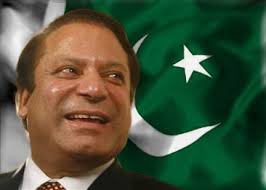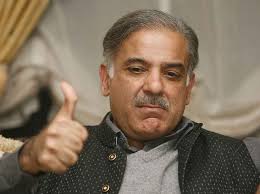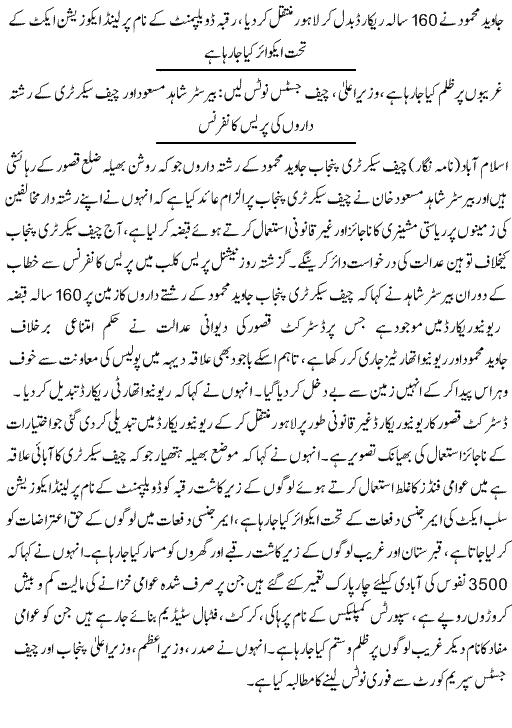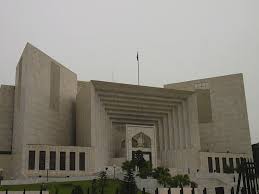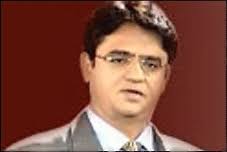
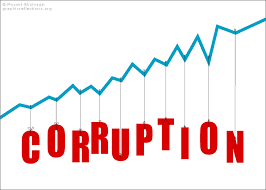
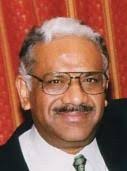


In the words Aal-e-Hashmat, there are certain innocent questions which beg answers :
· Why the flag-bearers of NRO scenario are blind towards this aspect of institutionalized corruption in Pakistan.
· Why only politicians and bureaucrats should be punished under NAB ordinance and not the army officials.
· Why the Parliament never thought of causing an amendment in the Army Act if the Generals cannot be investigated by NAB and cannot be tried in ordinary courts.
· Have any President of Pakistan, being Supreme Commander of forces, ever bothered to gather the statistics of inquiries or court martials conducted in connection with corrupt army officers and their organizations.
· Have the Supreme Court of Pakistan ever thought of initiating a suo moto action over any financial scam involving army generals.
· Have any Bar Association ever thought of moving a petition before the Supreme Court to bring corrupt army generals in the ambit of ‘equal citizenship’ given in the Constitution of Pakistan.
· Have any prominent anchor of media like Kashif Abbassi, Hamid Mir, Dr Shahid, Mazhar Abbas and Talat Hussain ever tried to float an opinion inviting discussions and comments of intelligentsia over the issue that if politicians and bureaucrats are being dragged in the streets of public consent then the generals should also be treated at par.
Let us hope that the Supreme Court steps forward to provide justice on the basis of equal basic rights for all and no citizen of Pakistan or institution be declared as ‘sacred cow’ now.
FACT SHEET
Track Record of Musharraf Regime
Released by Muhammad Siddique-ul-Farooque Central Information Secretary
Pakistan Muslim League (Nawaz) at a press conference on Sunday , October 06,2002.
The government of General Pervez Musharraf, which forced its way into power on October 12, 1999, has completed the tenure allowed to it by the Supreme Court under the controversial Rule of Necessity. It is time that the people of Pakistan take stock of the three-years performance of this regime, and decide through ballot whether they would like their elected government to continue the policies and mode of government introduced and practiced by the military rulers, or they want a government more open, more competent, more efficient, more sincere, more answerable and more responsive to the needs and aspirations of the nation.
CORRUPTION
One of the reasons, belatedly stated by General Musharraf for his capture of power, was that he wanted the country rid of corruption. In fact, his move was designed to provide protection to the most corrupt element in Pakistan -- the top brass of the armed forces. Out of the 135 billion rupees of defense budget, about one third of the amount, or 45 billion rupees are normally spent on purchase of weapons and equipment. And, as this fact sheet would show, an estimated amount of 31.64 billion went into the pockets of corrupt generals and other senior officers.
1. Land Grabbing: The colonial tradition of land grabbing by military officers continued unabated during the past three years.
a) 111 armed forces men have allotted to themselves at least 400 or more kanals each of prime land in Bahawalpur and Rahimyar Khan districts, heart of Punjab, "to defend it from the enemy," at the throw away rate of Rs 47.5 per kanal, while the real price in those areas ranges 15,000 to 20,000 rupees per kanal. Thus 35,000 kanals of land were distributed among 111 military men in one case alone. Theypaid 1,662,500 rupees at the nominal rate of 47.5 rupees per kanal, while the real price comes to 700 million rupees. The list includes the names of:
· General Pervez Musharraf, Current President, 400 kanals in Nouabad village, Yazman, Bahawalpur.
· General Moinuddin Haider, Current Interior Minister, 400 kanals in Chak DB/43.
· General Aziz, Chairman Joint Chiefs of Staff Committee, 400 kanals in Chak DB/44.
· Lt. General Khalid Maqbool (Current Governor Punjab), 400 kanals in Chak 54/p.
· Major General Muzaffar Usmani (Later promoted to Lt General and retired recently as Deputy Chief of Army Staff Musharraf), 400 kanals in Chak 93/p.
· Lt. General Muhammed Afzal Janjua, 400 kanals in Chak 54/p
(i) 64 serving and retired officers of colonel to general rank got 400 kanals or more. They include:
10 Generals, 9 Lt. Generals, 16 Maj. Generals, one Admiral, one Air Marshal, 18 Brigadiers, 5 Lt. Colonels and 3 Colonels.
They paid 19,000 rupees for 400 kanals of land worth 400,000 rupees at market ratesif the land is unirrigated. The value of irrigated land in these areas is much higher.
(ii) 47 non-commissioned officers also got plots of agricultural land measuring 200 kanals or less.
Many of the generals have already sold their lots earning millions of rupees in profit at market rates, while others have turned into feudal lords with hired labor toiling for them.
b) Former Chairman of national Accountability Bureau Lt. Gen. Muhammed Amjad was allotted a 2-kanal (1000 sq. yd.) plot in Lahore, with a market value of 10 million rupees, against mere 800,000 rupees payable in 20 years. Invested in Defense Saving Certificates, those 800,000 rupees would multiply to 225 million rupees. He immediately sold half of the plot for 4.5 million rupees earning a profit of 8.2 million rupees on one plot.
c) General Musharraf has acquired a commercial plot, with the market value of 20 million rupees, in Defense Society, Lahore, for mere 100,000 rupees that he will pay in installments spread over 20 years. The General has neither showed this piece of land in his assets, nor sold it. If 20 million rupees are invested in the Defense Saving Certificates, they would grow up to about 500 million rupees. He owns several plots in other localities with a total market value of 200 million rupees. He has gifted a house with a market value of 20 million rupees to his daughter, which he has not shown in his assets. The 400 kanal agricultural plot that he got in Bahawalpur is also not mentioned in his assets.
d) The ISI has forced Environment Minister Shahida Jameel to allot 100 acres of land in the Margalla Hills National Park, one of the big attractions of the capital city. The agency wants to construct a new and “safe” Headquarter as well as, quite intriguingly, a housing colony for its officers. An official summary generated by Barrister Jameel’s ministry has been sent to President Pervez Musharraf, for an urgent decision. Initially the Environment Ministry response was one of alarm, as giving away 100 acres on these hills would almost destroy the whole area as a natural park, which needed to be preserved. When the ISI bosses learned about it, they immediately contacted the Minister and “convinced” her about the immediate need of 100 acres. The lady, naturally, could not resist the pressure. Again, the Generals would grab the best pieces for their homes.
e) Another 100 acres is being selected in Bahawalpur for the outgoing Naval Chief. Defense officials’ teams have been seen visiting Bahawalpur to select these 100 acres, while an offer had also been made to the outgoing Chief to become Pakistan’s Ambassador to Tunisia. The Chief wants to be Ambassador to France and his argument is that his force has a lot to buy from France, like the Augusta submarines his predecessor Admiral Mansurul Haq bought.
f) In a report, after a random check of 4 out of 11 military estate offices in 2000 –2001, Director General of Audit of the Defense Services has found close to five billion rupees loss caused by misuse of land, mismanagement and encroachments. According to an analyst, “the report is an outright indictment of the military, as it not only shows the monumental size of the lands acquired, but also the losses being caused are gigantic, compared to peanuts for which politicians are persecuted day in and day out.”
g) The Defense Housing Authority has been grabbing large chunks of valuable residential land at nominal prices around the country for the exclusive benefit of officers of the armed forces. For instance, in January 2001, the Sindh Governor bypassed the Sindh High Court stay orders, and permitted sale of highly valuable 200 acres of coastal land along Clifton, Karachi, at embarrassingly low rates to Defense Housing Authority. The land valued at market rate of Rs. 4,000/- per square yard was sold to Defense Housing Authority at Rs 20/- per square yard. Thus, the governor caused a staggering loss worth billions of rupees to the exchequer! An acre contains 4840 square yards. The real cost of 200 acres, multiplied by 4,000 per sq. yd. comes to 3.872 billion rupees.
2. Defense Purchases: The submarine purchase scam involving Mansurul Haq is only a tip of the iceberg. Many more such deals with heavy kickbacks are hidden in the military closets. A large of deals for purchase of tanks, submarines, mine hunters, Mirage aircraft and army jeeps were signed through the Army Welfare Trust, Sheen Foundation and Bahria Foundation. It is estimated that various military officers pocketed commissions totaling 5.7 billion rupees in these deals.
a) A former NAB Chairman is reported to have written to the three service chiefs to provide records of certain arms deals, but NAB still awaits an answer.
b) The records could provide proof to the allegation that a former air chief Abbas Khatak received three million dollars (180 million rupees) in the purchase of 40 old Mirage aircraft for 120 million dollars. He is also accused of receiving kickbacks in deals for French missiles and Italian radars.
c) Another former air chief Farooq Feroze Khan is suspected of receiving 5 percent commission on purchase of 40 F-7 aircraft for 271 million dollars.
d) In 1996, Army bought 1047 GS-90 jeeps at 20,889 dollars per jeep, while the market price of the jeep was 13,000 dollars. NAB sources have been reported saying that some senior army officers pocketed 8.5 million dollars (510 million rupees).
e) The British Inland Revenue Services wrote a confidential letter to the Central Board of Revenue (CBR) in Islamabad to confirm a payment of five million pound sterling (450million rupees) in commission to an Islamabad-based Pakistani citizen who had acted as an intermediary between the British agent of an American company and the Pakistan Army for an 80 million pound sterling deal.
When summoned to the CBR in Islamabad for confirmation about the payment he had received from London, the Pakistani agent stunned the then chairman CBR Moinuddin Khan by acknowledging, unhesitatingly, that he had received the amount mentioned in the letter.
This shadowy businessman soon dropped a bombshell by disclosing that he got only 200,000 (2 lakh) pounds from the total payment of five million pounds (50 lakh pound) while the remaining amount was distributed among four senior officers of the Army. He also provided an actual breakdown of the payments and impressed upon the then CBR chairman that the then Chief of Army Staff had personally authorized the contract, meaning the COAS was also involved in corruption.
Within next few days a retired major general, who was the former Director General Weapons and Equipment (DGW & E) at the GHQ and had structured the deal with the American company through its British agent, approached the top CBR official and briefed him as how the disclosure and any probe into this deal would jeopardize the national security interest of the country.
After a flurry of activities between the CBR and some retired military officials, the CBR shelved the matter. This controversial deal is understood to be in the knowledge of the present military set-up, but there is nothing on the ground to suggest that it is being probed afresh.
f) Around June/July this year, Pakistan Army awarded a contract for purchase of 1000 Hino trucks at $40,000 per truck, while the Gandhara Industries had offered Isuzu truck of same specifications at $25,000. As per standard procedures for bulk military purchases in Pakistan, no international tenders were invited but tender documents were sent to four pre-selected companies for procurement of 1,000 5-ton 4x4 trucks (ammunition carrier vehicle) by the director general military purchase on April 10. Gandhara Industries sources dispute the Army's claim that their vehicle was not approved as 5-ton ammunition carrier. The Isuzu trucks were delivered to the Army for extended trial in February and after two months of trials the vehicle was finally short-listed and approved as 5-ton ammo carrier at the GSEEC meeting held on April 13. However, the top brass made final decision in favor of the Hino trucks. The loss to the national exchequer in this deal, at the rate of $15,000 per truck amounted to $15,000,000 (900 million rupees).
g) Pakistan Army's purchase of more than 3,000 Land Rover trucks in 1995 had also generated controversy with the allegation that the owner of Sygma motors, which had supplied the vehicles, was closely associated with the then chief of general staff of the Pakistan Army. Corruption amounting to 2 billion rupees is alleged in that deal.
h) The Field General Court Martial (FGCM) sentenced former Naval Intelligence Chief Commodore Shahid to 7 years of hard labor, but former Chief of Naval Staff Admiral Fasih Bukhari wrote off his sentence after three months, which he had spent in the comfort of his home. It is believed he was freed after he threatened to disclose many more shady deals including a 250 million dollars purchase of mine sweepers.
i) In April 2001, the Public Accounts Committee ordered court trial of 22 corrupt officers of Garrison Engineers (Army) Rawalpindi for causing over a loss of over one billion rupees to the national exchequer with dubious purchases and embezzlement. Defense Ministry officials present at the PAC hearing opposed publication of the culprits’ names, whereupon senior PAC member Lt. General Talat Masood (retd.) admonished them and said that hidden faces involved in corruption must be exposed.
3. WAPDA: The Water and Power Development Authority (WAPDA), controlled by army officers, has raised power rates 13 times during the past three years totaling 40 percent rise over the 1999 levels. The authorities always take shelter behind the pretext of budget deficit. But analysts have pointed out that the deficit is mainly due to mismanagement and rampant corruption. One instance of blatant corruption is as follows:
WAPDA purchased over three million electricity meters during past three years at exorbitant prices of Rs 1,050 and Rs 1,125 per meter. All these purchases were made by bypassing the due process of open tenders and made through closed-door negotiations. The real cost of a meter comes to around Rs 456 per piece. Thus, 1.65 billion rupees were pilfered in this deal.
4. Motorway: The Motorway Project was a product of creative imagination of Prime Minister Muhammed Nawaz Sharif. He completed the Lahore-Islamabad motorway, and the contract for Islamabad-Peshawar motorway was given to a Turkish firm. It was to be completed by December 2000. The military regime, after cutting the size of six-lane road to four lanes, forced that contractor to withdraw by delaying payments and creating administrative hurdles. Later, the contract was awarded to a new Pakistani consortium lead by Husnain Construction, without floating any tender. The firm hired the services of Brig. Aftab Siddiqui (retd.), father-in-law of Musharraf’s son Bilal, as consultant. Husnain Construction owner Yousaf Sheikh told a news conference in Islamabad that Brig Siddiqui was to be given a share of 2 percent in the profit, and that his company’s business under the current military rule included purchase of about a dozen of “sick industrial units”.
5. Karakoram Express: Pakistan Railways, headed by former ISI chief, made a deal of purchasing 175 passenger coaches from a Chinese firm for 200 million dollars despite the fact that the Pakistani factories were fully competent to manufacture the coaches, which have even found many foreign buyers. When 35 of these coaches arrived in August, they were found to be much wider than the railway platforms in the country could accommodate. Millions of rupees had to be spent on trimming the platforms. Many more millions were earlier spent from the national exchequer on numerous visits of the Railways chief and his experts to China. It appears that their concerns in those visits were other than discussing technical details of the deal. It was a test case for probe into suspicions of corruption, as well as lack of foresight and competence. But neither an inquiry for fixing responsibility was announced nor any heads were seen rolling.
6. UBL Sale: The Privatization Commission of the Musharraf regime sold 51 percent shares of the United Bank Ltd. for 12.35 billion rupees to a consortium with foreign participation through an out of the process re-bidding that in no way can be termed as transparent.
UBL is Pakistan’s fourth largest bank with 1,400 branches in the country and 16 international branches, manned by 11,000 strong work force. Senior officers of the Finance Ministry had been expecting to get a price of 20 billion rupees, while the successful bidder was also reported to be willing to pay 17 billion rupees. However, the Privatization Commission let it go for mere 12.35 billion, and the regime immediately issued a Letter of Acceptance. The so-called financial wizards of General Musharraf conveniently passed over the chance of getting 7.65 billion rupees more for the national exchequer, but they cannot do away with widespread allegation that this amount was pocketed by officials.
7. Pak-Saudi Fertilizers Ltd.: The regime also sold Pak-Saudi Fertilizers Ltd. for just 7 billion rupees with huge profits, stocks and work in progress. The government failed to watch the interests of the nation in that deal also. It is alleged that corruption of about 2 billion rupees was committed in this deal.
8. Police Cars: The military regime officials have made it a regular practice of making huge purchases without calling tenders. For instance, in May 2002, the interior ministry purchased 349 luxury cars of up to 1300cc for investigation wing of the police. No tenders were called, and 259 million rupees were spent at the sweet will of the concerned officials. The officials have been committing this sort of corruption, because they are sure to get all of their illegal actions indemnified with the force of the gun.
9. Golf Club: Pakistan Navy spent 13.112 million rupees on installation of air-conditioners and sprinkler irrigation system in the Islamabad Golf Club, which is in the hands of a private organization. Public Accounts Committee was informed that the money was spent under a directive of former president Farooq Ahmed Khan Leghari now chief of the Millat Party, who happens to be one of the staunchest supporters of General Musharraf. In fact, the regime has condoned all misdeeds of Mr. Leghari, including the Mehran Bank scandal and renovation of his ancestral home with government money.
10. Special Education Fraud: Like the other departments of the military regime, the education department has also been indulging in corruption. It was reported in August 2002 that officers of the Special Education Directorate have pilfered 95 million rupees earmarked for education of handicapped children.
Conclusion
We present these facts to the people of Pakistan to illustrate the grim reality that deep-rooted corruption of the generals has soiled the reputation of national armed forces. It is, therefore, our considered opinion that mere internal system of checks in any institution fails to conduct impartial, transparent and effective accountability due to personal relationships and mutual interests.
The process of accountability should be impartial, uniform and across the board. The Musharraf regime has targeted the institution of politics as the bedrock of corruption. In reality, the corrupt have turned the institution of the armed forces into the most corrupt element of the society. It is essential that this institution, which used to be the pride of the nation, be saved from further disgrace, and its respect, credibility and prestige be restored with effective measures.
A high-powered representative commission with judicial authority should be set up to purge the armed forces of black sheep and recover the monies plundered by billionaire retired-generals and other officers. The commission should include Supreme Court judges of unblemished reputation, President and General Secretary of Pakistan Bar Council, Leader of the Opposition and the leaders of other parliamentary parties. This demand of ours is justified in view of fact the generals who captured power time and again from 1958 to 1999, mostly confined accountability to the politicians, while the generals alone were responsible for grave crimes of breaking the country and unmatchable corruption. Until big criminals are apprehended, the cause of justice would not be served and all claims of rooting out corruption would prove to be mere mirage.
.
A relevant comment:
By i_shah: (source: pkpolitics)
let us try to answer the questions raised in the article:
· Why the flag-bearers of NRO scenario are blind towards this aspect of institutionalized corruption in Pakistan.
-Most of these flagbearers of the NRO cause are opportunists, who cannot resist the urge of mid-term elections and the chances of themselves getting popular with all the hypethey are creating over the issue. Sadly the public is equally responsible for this attitude as is shown by the growing popularity of coas kiyani in gallup surveys, desspite the fact that he and his corps cmdrs are the main shield hindering the proseqution of military corrups
· Why only politicians and bureaucrats should be punished under NAB ordinance and not the army officials.
-the army considers itself above the law, getting away scot free from even gruesome incidents like the humiliation of a teacher by petty army guards. i believe no action was taken against them. in a civilized society a teacher occupies the prime position of respect- not so in ours. there was some hue and cry but ultimately it died out and now we as a nation hardly remember the incident – again a case of apathy on our parts.
· Why the Parliament never thought of causing an amendment in the Army Act if the Generals cannot be investigated by NAB and cannot be tried in ordinary courts.
– the parliment seems afraid that kiyani and co will send them packing if they dare tread that path. the “bedaar” media keeping mum over the issue and eulogising kiyani every now and then is certainly of no helf either. the parliment is helpless even as army personell-even lowly ranks- are not ready to pay a meagre Rs. 5 toll tax over roads and bridges. when they can not extract this small amount how can we expect them to recover millions out of the corrupt generals.
· Have any President of Pakistan, being Supreme Commander of forces, ever bothered to gather the statistics of inquiries or court martials conducted in connection with corrupt army officers and their organizations.
-the supreme commander has never been acknowledged as such by the army. how can we expect him to act and court martial corrupt army officers. kiyani and co will act over night and depose him in “supreme national interest” with his huge unpopularity and corruption being cited as primary reason-by the corruption of the current president is nowhere near that of his military counterparts ayub/zia and old mush and even other generals/A.Ms/admirals.
· Have the Supreme Court of Pakistan ever thought of initiating a suo moto action over any financial scam involving army generals.
-the supreme court can only act within the ambits of the constitution, which sadly doesnot allow for them to be prosecuted in ordinary courts. even if the CJ takes action, there will be a lot of hue and cry raised in the name of the army getting demoralised in the middle of war on terror. interestingly, it was zia who laid the eggs of terrorism, which hatched into the present brood of terrorists in the form of taliban, laskar e jhangvi etc.
· Have any Bar Association ever thought of moving a petition before the Supreme Court to bring corrupt army generals in the ambit of ‘equal citizenship’ given in the Constitution of Pakistan.
-i guess the public’s sypathies for the army -as indicated by kiyani’s popularity graph from gallup surveys- hinders the prospect of such a scenario taking place
· Have any prominent anchor of media like Kashif Abbassi, Hamid Mir, Dr Shahid, Mazhar Abbas and Talat Hussain ever tried to float an opinion inviting discussions and comments of intelligentsia over the issue that if politicians and bureaucrats are being dragged in the streets of public consent then the generals should also be treated at par.
-thats one question that should be put to these popular anchors- and ourselves who make these anchors popular
Read more...





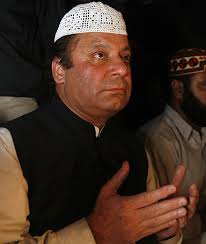






 vs
vs 


